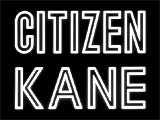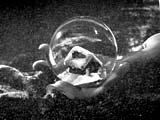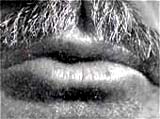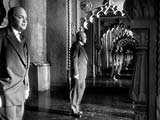
|
Citizen
Kane (1941)
In one of filmdom's most celebrated films with many
landmark cinematic techniques (including dramatic lighting and deep-focus),
from co-writer/actor/director Orson Welles:
- the opening prologue including the shot of media
tycoon Charles Foster Kane's (Orson Welles) estate of Xanadu and
the uttering of the mysterious word "R-o-s-e-b-u-d"
(the film's first line) by the giant rubbery lips of a dying, mustached
man as a crystal globe/ball of a snowy scene (of a snow-covered house)
fell from his hand and shattered
- the "March of Time" newsreel sequence
- the scene in the smoky projection room where shafts
of light came from the projection booth and the reporters were told
to investigate the enigmatic meaning of Kane's last word

|

|

|
|
Kane Estate of Xanadu
|
Snow-Globe Falling from Kane's Dying Hand
|
"Rosebud"
|
- the deep-focus scene as young Kane played in the
snow outside and his future guardian talked to his parents inside
- the clever transition when a picture of a newspaper
staff came to life
- the Walter P. Thatcher library flashback sequence
- the famous breakfast montage scene that symbolized
the deterioration of Kane's marriage
- the dolly shot/dissolve into the skylight of Susan
Alexander's (Dorothy Comingore) nightclub
- Kane's explanation to his accountant: "You're
right, I did lose a million dollars last year. I expect to lose a
million dollars this year. I expect to lose a million dollars next
year. You know, Mr. Thatcher, at the rate of a million dollars a
year, I'll have to close this place in 60 years"
- Bernstein's (Everett Sloane) speech about his memory
of a girl with a white dress and a parasol ("A fellow will remember
a lot of things you wouldn't think he'd remember. You take me. One
day, back in 1896, I was crossing over to Jersey on the ferry. And
as we pulled out, there was another ferry pulling in. And on it there
was a girl waiting to get off. A white dress she had on. She was
carrying a white parasol. I only saw her for one second. She didn't
see me at all. But I'll bet a month hasn't gone by since that I hadn't
thought of that girl")
- Kane's memorable political speech
- the memorable boom shot upward to two stage hands
who commented on Susan's disastrous operatic debut
- Kane's firing of Jedediah Leland (Joseph Cotten)
and his finishing of the negative review of his wife's performance
- the images of Xanadu's huge fireplace and Susan hunched
over a crossword puzzle
- the startling jump cut to a screaming bird
- the scene of Kane's angry furniture-destroying rage
after Susan's departure
- his stumbling walk through the mirrored hall
- the panoramic view of Kane's basement warehouse and
its many discarded mementos, and butler Raymond's command: "Throw
that junk"
- the final fadeout scene from the time the reporters
started up the stairs to a shot that closed in on the incineration
of a sled in the furnace -- (revealing the meaning of "Rosebud" as
Charles Kane's childhood playtoy) - and the smoke rising toward the
sky
- the end credits sequence - including clips from the
film highlighting or underscoring the footage, with each actor's
name (from the Mercury Company) - ending with the film's actual last
line of dialogue from Walter Parks Thatcher (George Coulouris): ("I
think it would be fun to run a newspaper"), accompanied by the
sounds of a jaunty, march version of The Charlie Kane Song; after
the clips, the remainder of the cast was listed on a single card
(white letters on black), with Orson Welles' credit listed last as
simply "Kane"
|

Kane's Parents

Kane's Firing of Jedediah Leland (Joseph Cotten)

Kane's Break-up with Susan Alexander
(Dorothy Comingore)

Kane's Image in Mirrored Hall

Kane's "Rosebud" Sled in Furnace

Closing Credits
|







